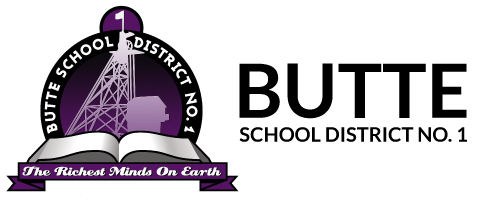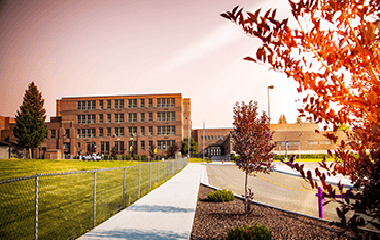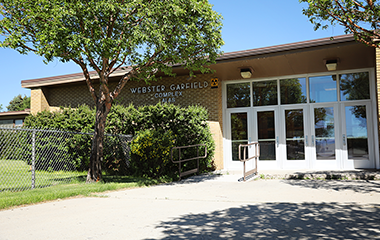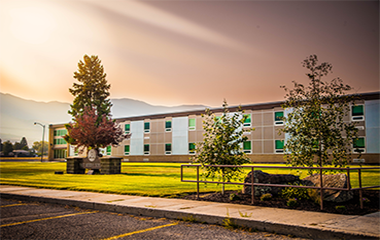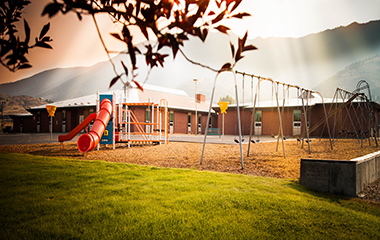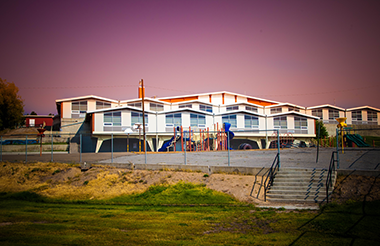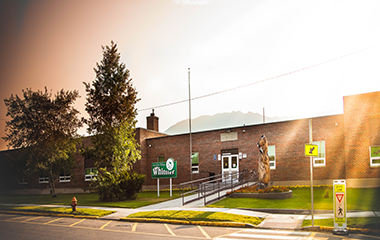Butte School District
THE BOARD OF TRUSTEES
3612
District-Provided Access to Electronic Information, Services, Equipment, and Networks
General
Internet access and interconnected computer systems and equipment are available to the District’s students and faculty. The District provides equipment and electronic networks, including access to the Internet, as a part of the District’s instructional program in order to promote educational excellence by facilitating resource sharing, innovation, and communication.
The District expects all students to take responsibility for appropriate and lawful use of this access, including good behavior online. The District may withdraw student access to its equipment, network and to the Internet when any misuse occurs. District teachers and other staff will make reasonable efforts to supervise use of equipment, network, and Internet access. However, student cooperation is vital in exercising and promoting responsible use of this access.
Curriculum
The use of the District’s equipment electronic networks shall be consistent with the curriculum adopted by the District, as well as the varied instructional needs, learning styles, abilities, and developmental levels of the students, and shall comply with the selection criteria for instructional materials and library-media center materials. Staff members may, consistent with the District’s educational goals, use the Internet throughout the curriculum.
The District’s electronic network is part of the curriculum and is not a public forum for general use.
Acceptable Uses
- Educational Purposes Only. All use of the District’s equipment and electronic network must be: (1) in support of education and/or research, and in furtherance of the District’s stated educational goals; or (2) for a legitimate school business purpose. Use is a privilege, not a right. Students and staff members have no expectation of privacy in any materials that are stored, transmitted, or received via the District’s electronic network or District computers. The District reserves the right to monitor, inspect, copy, review, and store, at any time and without prior notice, any and all usage of the equipment and computer network and Internet access and any and all information transmitted or received in connection with such usage.
- Unacceptable Uses of Equipment and Network. Unacceptable uses which constitute a violation of this policy include but are not limited to the following:
A. Uses that violate the law or encourage others to violate the law, including, but not limited to, transmitting offensive or harassing messages; offering for sale or use any substance the possession or use of which is prohibited by the District’s student discipline policy; viewing, transmitting, or downloading pornographic materials or materials that encourage others to violate the law; intruding into the networks or computers of others; and downloading or transmitting confidential, trade secret information, or copyrighted materials.
B. Uses that cause harm to others or damage to their property, including, but not limited to, engaging in defamation (harming another’s reputation by lies); employing another’s password or some other user identifier that misleads message recipients into believing that someone other than you is communicating, or otherwise using his/her access to the network or the Internet; uploading a worm, virus, other harmful form of programming or vandalism; participating in “hacking” activities or any form of unauthorized access to other computers, networks, or other information.
C. Uses that jeopardize the security of student access and of the computer network or other networks on the Internet.
D. Uses that are commercial transactions. Students and other users may not sell or buy anything over the Internet. Students and others should not give information to others, including credit card numbers and social security numbers.
E. Uses that violate the academic honesty requirements of Policy 3310P-2, including, but not limited to, use of District networks or equipment to access artificial intelligence or other online resources without prior authorization of the classroom teacher for the purpose of engaging in academic dishonesty.
Warranties/Indemnification
The District makes no warranties of any kind, express or implied, in connection with its provision of access to and use of its equipment, computer networks and the Internet provided under this policy. The District is not responsible for any information that may be lost, damaged, or unavailable when using the equipment, network, or for any information that is retrieved or transmitted via the Internet. The District will not be responsible for any unauthorized charges or fees resulting from access to the Internet, and any user is fully responsible to the District and shall indemnify and hold the District, its trustees, administrators, teachers, and staff harmless from any and all loss, costs, claims, or damages resulting from such user’s access to its equipment, computer network and the Internet, including, but not limited to, any fees or charges incurred through purchases of goods or services by the user. The user or, if the user is a minor, the user’s parent(s)/legal guardian(s) agrees to cooperate with the District in the event of the school’s initiating an investigation of a user’s use of his/her access to its equipment, computer network and the Internet.
Violations
If any user violates this policy, the student’s access will be denied, if not already provided, or withdrawn and he/she may be subject to additional disciplinary action. The system administrator and/or the building principal will make all decisions regarding whether or not a user has violated this policy and any related rules or regulations and may deny, revoke, or suspend access at any time, with his/her/their decision being final.
Violation of this policy will result in a loss of access and may result in other disciplinary or legal action. The principal will make all decisions regarding whether a user has violated this policy and any related rules or regulations and may deny, revoke, or suspend access at any time, with that decision being final.
Legal Reference:
Cross Reference:
Policy History:
Adopted on: 10/18/04
Revised on: 6/20/22, 11/17/25
- 3102 - Attendance Area Policy
- 3102P - Attendance Area Policy Continued
- 3102F-1 - Request for Student Boundary Waiver (opens in new window)
- 3102F-2 - Request for Student Records (opens in new window)
- 3102 F-3 Special Power of Attorney for temporary custody assignment
- 3102F-4 - Student Transfer Form (opens in new window)
- 3110 - Entrance, Placement & Transfer
- 3120 - Compulsory Attendance
- 3121 - Enrollment & Attendance Records
- 3121F - Education Authorization Affidavit (opens in new window)
- 3121P - Enrollment & Attendance Records Continued
- 3122 - Attendance Policy
- 3122P - Attendance Policy Continued
- 3125 - Education of Homeless Children
- 3125F - McKinney-Vento Homeless Education Assistance Dispute Resolution Form (opens in new window)
- 3130 - Students of Legal Age
- FP-14.1 Out of District Attendance Agreement (opens in new window)
- 3141 - Discretionary Nonresident Student Attendance Policy
- 3141 F-1 Application for Out of District Attendance (opens in new window)
- 3141 F-2 FP-14.1 Parent or District Student Attendance Agreement FY2026 (opens in new window)
- 3141 F-3 - FP-14.2 Foster and Group Home Student Attendance Agreement FY2026 (opens in new window)
- 3141P - Nonresident Student Enrollment
- 3145 - Foreign Exchange Students
- 3150 - Part-Time Attendance
- 3200 - Student Rights & Responsibilities
- 3210 - Equal Education, Nondiscrimination & Sex Equity
- 3215 - Uniform Grievance Procedure
- 3221 - Student Publications
- 3222- Distribution & Posting of Materials
- 3224 - Student Dress
- 3225 - Sexual Harassment/Intimidation of Students
- 3225F - Harassment Reporting Form for Students
- 3225P Procedure Sexual Harassment of Students
- 3226 - Hazing...
- 3231 - Searches & Seizures
- 3231P - Searches & Seizure Continued
- 3233 - Student Use of Buildings; Equal Access
- 3235 - Video Surveillance
- 3300 - Corrective Actions & Punishments
- 3300F - Notice of Hearing (opens in new window)
- 3300P - Corrective Actions & Punishments Continued
- 3310 - Student Discipline
- 3310P - Discipline of Students with Disabilities (opens in new window)
- 3330 - Use of Alcohol-Sensor Device
- 3403F - Student Participation Form
- 3403 - Extracurricular Participation
- 3405 - Missing School Children
- 3405P - Missing School Children Continued
- 3410 - Student Health/Physical Screenings/Examinations
- 3410FMedical Examination Notice Permission
- 3413 - Student Immunization
- 3413-F2 Religious Exemption
- 3415 - Management of Sports-Related Concussions
- 3416 - Administering Medicines to Students
- 3415P - Management of Sports-Related Concussions
- 3416F - Designation and Acceptance to Administer Glucagon
- 3416F-1 Standing Order-Administering Medicines to Students
- 3416F-2 Standing Order Log Sheet
- 3416F-A - Medication Administration Training Within the School
- 3416F-B - Administration of Liability Release & Medication Order
- 3416F-C - Daily Medication Log
- 3416F-D - Student Log for PRN - "As Needed" Medication Administration
- 3416F-E - Student Log for Emergency Medication Administration
- 3416F-G - Protocol for Emergency Use of Epinephrine for Anaphylaxis
- 3416F-H - Log for Administration of Stock Supply
- Addendum 3416F-I Stock Supply Naloxone
- 3417 - Communicable Diseases
- 3431 - Emergency Treatment
- 3440 - Removal of Student During School Day
- 3440P - Removal of Student During School Day Continued
- 3510 - School-Sponsored Student Activities
- 3510P - Requesting, Approving & Scheduling of Field Trips
- 3510F-1 - Application for Field Trip
- 3510F-2 - Parent Consent (opens in new window)
- 3510F-3 - Insurance
- 3520 - Student Fees, Fines & Charges
- 3520P - School Nutrition Services Procedures & Rules
- 3520F-1 School Nutrition Meal Agreement
- 3535 - Distribution of Fund Drive Literature Through Students
- 3530 - Student Fund-Raising Activities
- 3600 - Student Records
- 3600P - Student Records Continued
- 3600F-1 - Student Records Continued (opens in new window)
- 3600F-2 - Student Records Continued
- 3606 - Transfer of Student Records
- 3606F - Transfer of Student Records Continued
- 3608 - Receipt of Confidential Records
- 3610 - Programs for At Risk/Disadvantaged Students
- 3611 - Gangs & Gang Activity
- 3612 - District-Provided Access to Electronic Information, Services & Networks
- 3612F - Internet Access Conduct Agreement (opens in new window)
- 3612P - Acceptable Use of Electronic Networks
- 3630 - Cell Phones & Other Electronic Equipment
- 3615 - Crisis Intervention/Management
- 3650 - Pupil Online Personal Information Protection
- 3655 - Student Safety
This site provides information using PDF, visit this link to download the Adobe Acrobat Reader DC software.
